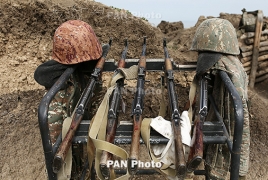 War rules for conflicting sidesGeneva Conventions The Geneva Conventions ratified by 196 countries are a set of treaties regarding humanitarian issues of civilians and combatants in wartime. The Geneva Conventions extensively defined the basic rights of wartime prisoners (civilians and military personnel); established protections for the wounded and sick; and established protections for the civilians in and around a war-zone. PanARMENIAN.Net - However, the efficiency of the conventions has been questioned for the conflicts in Syria, Yemen, Mali, Cote d'Ivoire, Iraq, Afghanistan and Nagorno Karabakh, where attacks on hospitals, sexual assaults against the civilian population and execution of captives take place. At the time when the Conventions were ratified, the war was fought by armies at battlefields. Nowadays, fighting can break out near a service main that provides houses, schools and hospitals with water. This is a rough violation of the Conventions and is rated as a war crime, envisaging punishment for the crime against humanity. Each country that ratified the Conventions is obliged to search for people, who are accused of violations of the clauses and put them on trial irrelative of their citizenship. In 1993, the United Nations Security Council adopted a report from the Secretary-General and a Commission of Experts which concluded that the Geneva Conventions had passed into the body of customary international law, thus making them binding on non-signatories to the Conventions whenever they engage in armed conflicts. The Conventions were developed, when the sides came to mutually beneficial agreement. However, when the benefits become less obvious, the interest in cooperation disappears as well, what results either in one-sided forcible implementation of the Conventions (as it was in case with Kosovo, when the rules were imposed on Serbia only, while the crimes of Albanians remained unpinished) or in mutual violations (as it was during the Iranian-Iraqi conflict), or in one-sided violations (the actions of Azerbaijan during the Nagorno Karabakh conflict). Thus, a question arises: why obey rules if your enemy doesn’t? Nevertheless, the Geneva Conventions represent a powerful legal tool to alleviate people’s sufferings during wars. These are rules that apply only in times of armed conflict and seek to protect people who are not or are no longer taking part in hostilities; these include the sick and wounded of armed forces on the field, wounded, sick, and shipwrecked members of armed forces at sea, prisoners of war, and civilians. The First Convention dealt with the treatment of wounded and sick armed forces in the field. The Second Convention dealt with the sick, wounded, and shipwrecked members of armed forces at sea. The Third Convention dealt with the treatment of prisoners of war during times of conflict. The Fourth Convention dealt with the treatment of civilians and their protection during wartime. The most serious crimes are termed grave breaches, and provide a legal definition of a war crime. Grave breaches of the Third and Fourth Geneva Conventions include the following acts if committed against a person protected by the convention: -willful killing, torture or inhumane treatment, including biological experiments -willfully causing great suffering or serious injury to body or health -compelling a protected person to serve in the armed forces of a hostile power -willfully depriving a protected person of the right to a fair trial if accused of a war crime. Also considered grave breaches of the Fourth Geneva Convention are the following: -taking of hostages -extensive destruction and appropriation of property not justified by military necessity and carried out unlawfully and wantonly -unlawful deportation, transfer, or confinement. Article 3, common to the four Geneva Conventions, requires humane treatment for all persons in enemy hands, without any adverse distinction. It specifically prohibits murder, mutilation, torture, cruel, humiliating and degrading treatment, the taking of hostages and unfair trial. It requires that the wounded, sick and shipwrecked be collected and cared for. It grants the ICRC the right to offer its services to the parties to the conflict. The Geneva Conventions apply at times of war and armed conflict to governments who have ratified its terms. PanARMENIAN.Net / Tsets Who is who in the web of so many Sargsyans Controversy in quotations Split of opposition votes There will be no ideal solution 6 simple facts about Armenia–Karabakh–Azerbaijan triangle Main arguments of Armenia’s first President Bizarre election promises |